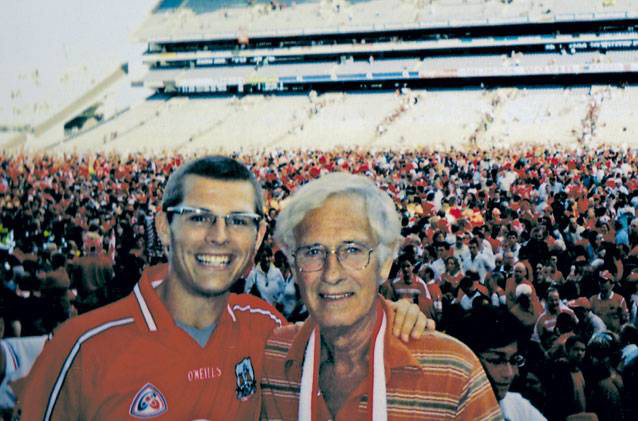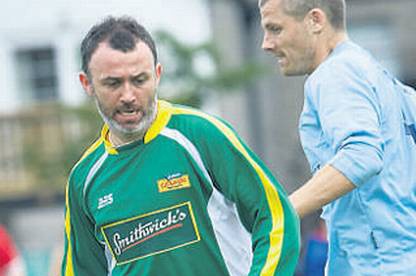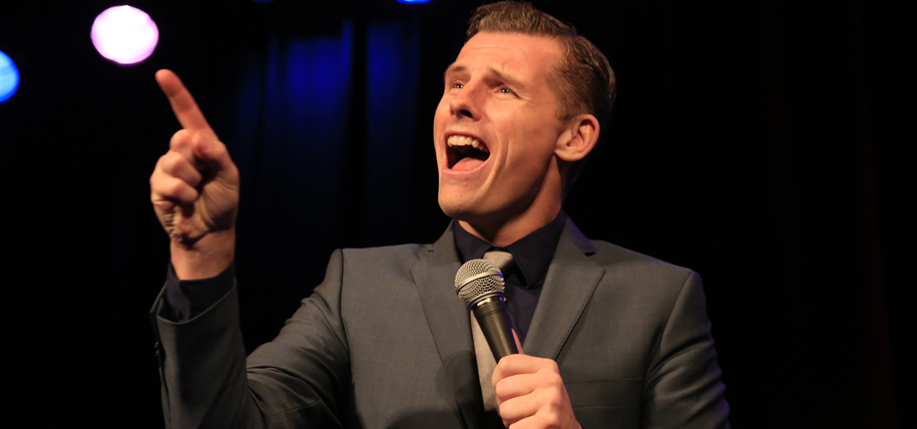He grew up in Queens, went to high school in Ireland, spent a year in the Gaeltacht, two years in China, and just bought an apartment back in New York. And here is an incomplete list of things he has done stand-up sets or made RTÉ documentaries about: living on minimum wage, alcoholism, his father’s lung cancer, low-income housing, the state of the Irish language, the marginalization of the working class, his diagnosis and treatment for testicular cancer, and, most recently, learning Mandarin in China. Yeah.
In March, Des Bishop was in New York performing his new show “Made in China,” a spinoff of his Breaking China documentary series which aired in Ireland last year. The show was playing at the Barrow Street Theater, an off-Broadway black-box style venue as cramped as it is quaint, located in the landmarked Greenwich House in the West Village, and known for being bold. So it wasn’t surprising when the lights dimmed for Bishop’s entrance, and a photoshopped image of Mao Zedong giving the audience the middle finger appeared projected on the backdrop. Or when the synth horns of Chinese hip hop began to play over the sound system. Or when Bishop finally emerged, rapping along in Mandarin, and got the audience to shout out the infectious single-word refrain with him. (His energy is contagious. He knows this, and plays it up.) Or even when he nailed the first punch line of the evening, feigning a shocked contentedness that he was able to make a group of white people shout the Chinese word for the male reproductive organ. And the audience ate it up.
℘℘℘
A week later, we’re walking down a street around the corner from the theater, and Bishop, though not dressed in the navy suit, white French cuff shirt, and floral tie he wears for the show, is talking with the same energy he does on stage – which is to say fast, manic, and with that specific 718 swagger only a working class white guy from Queens can have. And yes, he still has his accent, which gives a kind of old-world weariness and knowledge to everything he says.
We’re discussing his recent move back to the city. He hasn’t lived in New York permanently since 1990 and he’s joking that the only times he’s been back to his native Flushing for any amount of time have been to take care of his ailing parents. His father died in 2011, just a week after My Father Was Nearly James Bond, the documentary Bishop made on coming to terms with his father’s sudden diagnosis of terminal lung cancer, aired on RTÉ, and Bishop spent much of 2010 in New York.
This time, it’s his mother. And he’s trying to find a balance between the show (its first run in the U.S.), settling into Flushing again, finding caretakers, coordinating family time, and everything else that comes with having a family member in failing health. It’s taking a toll on him, and he says as much.
“But not for long!”
As soon as he says this, he does what he always does when he wants it to be clear, on stage or off: he just made a joke. (The night I saw “Made In China” contained a number of these moments, too.)
“I’m only kidding. Only kidding,” he says, putting his hand on his chest and leaning ever so slightly backwards, in earnest.
This is what Bishop does best – take the audience (or a profile writer) out of their sense of cultural safety with humor. But it’s also where responses can vary widely from show to show, and city to city. When I asked him about the audience response once we get to a café not far from Washington Square Park, he acknowledged New Yorkers were “just a little bit more polite,” which explains his “only kidding” tick that evening.
I almost take offense, and I’m not even from the city in the first place.
But he explains. New York is a diverse city, and maybe because of that “there’s an alarm that goes off in people’s heads a little quicker here than other places” when a comic does work that challenges stereotypes about other cultures.
“I guess the thing that’s hard to understand for people is I developed the show in China. These are jokes about Chinese people that Chinese people find funny. They’re observations about Chinese people that are not jokes about race. They’re jokes about the things that were happening around me,” he says.
“But I know that it’s hard for people to see it as something other than a joke about race. And there’s very few jokes in the show that rely on stereotypes, but a lot of comedy does rely on stereotypes and not all of it is inappropriate.”

The success of this work hinges on his ability to navigate the line between confession and astute observations of culture, often at the expense of widely known stereotypes and assumptions about cultural norms. This is a good thing. And he does it well, having honed what Corey Kilgannon, writing in The New York Times, calls his “caustic observational wit” over 25 years living in and joking about Ireland. But it’s not without its criticisms.
Prior to Breaking China, Bishop made a series called Under the Influence, which took an unforgiving look at the role alcohol plays in Irish cultural identity. The series, which also focused on Bishop’s own early struggles with alcoholism (he has been sober since 1995), generated a small controversy when it aired in Ireland, though Bishop was already in China at the time. (“Which was handy because a lot of people were angry.”)
Much of the criticism was leveled at Bishop himself, and came in the form of what he called “passive aggressive xenophobia.”
Basically, “people trying to say I’m not Irish and always putting me in this ‘he’s not Irish’ [category].”
That form of critique, he says, is easier to dismiss as trolling, because he’s comfortable with his sense of national identity. But he takes to heart the real criticisms of the topic of alcoholism the series stirred up.
“When I see people getting angry about that subject matter, I always think, well this is what you want, to a degree. You want people to be angry about it
because you are genuinely talking about a thing that’s difficult to hear. Challenging Irish people about how their identity is too linked to booze is difficult, and that’s the challenge in making a series like that. And it stands up,” he says.
“I take the genuine criticism and I’ll have a think about it, especially because that’s an issue thing,” Bishop says. “If I want to completely shut myself off from everything people don’t agree with, then that shows that I’m a bit narrow minded, that I’m not willing to learn more.”
Still, “When intelligent people dismiss you as non-Irish I always wonder where that’s coming from.”
℘℘℘
Bishop is 39 now, and grew up in Flushing at a time when the neighborhood was predominantly Irish and working class. But it was also a time, Bishop says, when “we were sold this idea that we were upper middle class” even though “everybody’s parents were blue collar.” It was a time in New York City when working for the city meant making a living wage, and he had a comfortable childhood.
“We all played on our own and we were all fine. Outside, unsupervised, our parents called us home,” he says.
“I think that it’s healthy. And you navigate your way around relationships and it’s not as involved. You had a bit more say in who you hung out with.
“I was raised in the more traditional Irish American way. A little bit of slapping going on,” he says, before clarifying that he thinks the current evolution of parenting is good, even if it is “a bit sanitized.”
“But this concept of thinking that evolution only brings positivity is naïve, because of course we’re going to find out that there’s consequences to this way too,” he adds. “But it’s fine, you know, trial and error.”
One of the biggest trials came during his freshman year at St. Francis Preparatory School in Queens with people he’s asked me to call, simply, “the Italian American kids from Howard Beach who were a little bit connected.” No names. Never names.
One of these connected kids’ friends liked Bishop’s girlfriend, and the rest of the connected kids put pressure on him, as they say.
“So, I sort of fell afoul of those guys. Which was frightening, especially in 1989 into 1990. That was a high profile time. And there was a real energy around those guys in my school. It’s mostly about the fact that those guys had a lot of—” he pauses. “People sort of looked up to them. That was the neighborhood that it was.”
Was he bullied?
“Well, back in 1990, it wasn’t like I was being bullied, they would probably say that I was going through some ‘tough shit.’”
At the same time this was happening, Bishop was also in trouble a lot for joking around. He thinks it would have been “a relatively normal level for probably a bit hyperactive kid – not that crazy.” (For this, we will take him at his word, because Bishop, performing or not, is an exceptionally self-aware human being and isn’t one to shy away from talking about his past behavior.)
He also was starting to have some problems with alcohol, getting in trouble for drinking, and disengaging with school. He wasn’t a terrible student, but he didn’t enjoy it, and didn’t fit in with the other students. That’s the real reason he moved to Ireland in the middle of high school, he says, not alcohol.
“So when the idea came up to go to Ireland, which was suggested to me by a cousin, not by my parents, I jumped at it. And I was lucky, because I never felt like I fit into Queens really. I played the role, but I never fit into my neighborhood really. I went to the wrong school… particularly in terms of the vibe. There was a lot of tough guy stuff going on. And so I put on a show, but I was not a tough guy. So I was happy, you know, when all that shit went down, I was happy enough to get out.”

Bishop may not have been particularly acquiescent to the Queens tough guy stereotype, but he does still have his Queens confidence, and of course his accent, all of which set him apart when he moved to a Wexford boarding school at the beginning of the following school year.
“I liked being the unique character – the kid from Queens in a rural boarding school… and it was great because it was just everything you could want as a result – I got interested in school, I had great fun, I found it all really inspiring, [especially] Irish history.”
He ended up on the student council, and went to University College Cork, where he studied history and English and became interested in the Irish language.
This distinguished him from his contemporaries at UCC, according to Joe Lee, head of the department of modern history while Bishop was there (now director of Glucksman Ireland House at New York University), who remembers his “appreciation of, and love for, the Irish language at a time when it was fashionable for quite a number in his age group, even in Cork, to be dismissive of it.” Learning the language, and attaining fluency in it, would become the subject of his third series for RTÉ, In the Name of the Fada, for which he moved to the Gaeltacht for a year. It was this series which gave him national acclaim and fame, in a traditional sense (You can read Irish America’s first interview with him from 2008 – in Irish – online.) But back to his beginnings.
In his third year at UCC, he was friends with a guy who ran a comedy club in Cork (Bishop had been sober for two years and knew the guy from “not drinking,” he says) who would give him and his friends free tickets. They went all the time, and Bishop started competing in what were, essentially, one-liner contests where the audience voted for the winner.
One night, says Bishop, “I guess I just started talking for quite a while so [the emcee] was like, ‘That’s it. In two weeks time you’re doing a spot. Do twenty minutes.’” Most Irish comics start out with five to seven minutes. Bishop was in the deep end. But, two weeks later, he did it.
“I guess the beginning and the end were good. The middle was rubbish, but I guess it was good enough that it was a good experience.”
From there, he fell straight into it. He moved to Dublin that summer, worked to establish himself, and when he began his final year, he already had one foot out the door.

“I was on the train most of my final year of college just going back up to Dublin as much as I could.” He finished with a 2.2 – a second class honors degree – and finds it hilarious that UCC recently gave him their Alumnus Award. (He told me in his speech he told the students that college is really about the extracurricular activities, because he knows he was an average student, “but the other stuff made me. Some of those relationships that I made in college still exist today.”)
He moved to Dublin immediately after graduation and a couple years later the head of development at RTÉ approached him to do a TV show about working and living on the minimum wage. The show, The Des Bishop Work Experience, was a reasonable success, and led to one of his most enduring friendships – with a Chinese immigrant who Bishop calls Seamus. They met while working at a Waterford Abrakebabra, and in 2004, Bishop went with him to China for the first time. Since then, he’d been thinking about doing a show in China.
℘℘℘
“You go to a place, you adapt, you learn about people, and then you find a way to sort of throw it back at them in a way that makes them laugh, you know? And then you find the bits that are universal.” Bishop is responding to a quote I’ve read him that he gave The New York Times about liking “messing with people’s identity.”
“You find the things about China, you find the things about Mount Vernon [a Protestant Belfast estate where he did stand-up workshops for his second series, Joy in the Hood], you find the things about working on minimum wage that aren’t just funny to the people who know what you’re going through. But when you show them, they’re also funny to everybody else, and hopefully informative. That’s kind of the formula.”
He really does love it, too. When In the Name of the Fada wrapped, he seriously considered moving to the west of Ireland full-time. But the next thing happened, and he moved on. So when the opportunity came for him to stay in China after Breaking China was done shooting, he jumped at it. He spent almost two years there, went on two TV dating shows (no luck), and now is trying to convince his girlfriend Shauna to move from China to Flushing with him. (“We get on great, but it’s a killer long distance. So it really depends on whether she wants to emigrate.”)
“I used to cycle around the first year living in China, finish school, go somewhere on my bike, I’d listen to Chinese hip hop on my headphones, and I just thought to myself like, ‘How did I end up here? How is this my life?’ It was just the freedom to wander around this other city and not know anybody and yet be so comfortable and so content in that scenario,” he says.
Really?
“Oh yea, so happy. I absolutely loved it. But who knows, there may be a psychiatrist or psychologist reading this article going ‘I’ll tell you what that is. That’s a serious condition that guy has.’” ♦


Leave a Reply